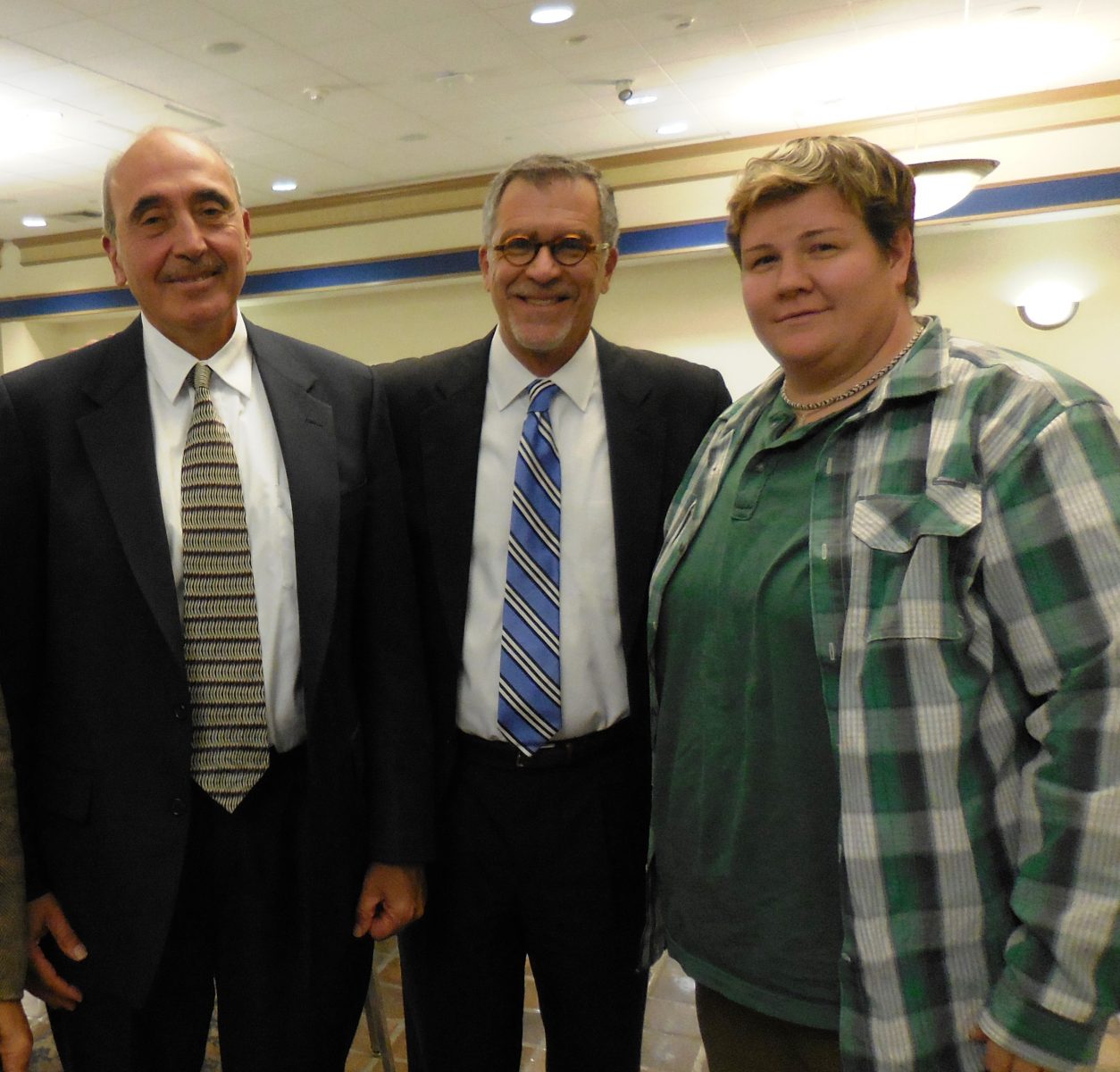WESTFIELD – Thursday evening, Damian J. Fernandez met with a small group of alumni and staff, including one who called in from Australia. The meeting was the last for Fernandez in a day which began at 7:15 a.m. Friday. He met with more constituency groups on campus, ending with an open forum for students.
Fernandez, who is currently Chief Executive Officer and Head of School for the Ethical Culture Fieldston School in New York City, began by saying what attracted him to Westfield State is that “it gets one thing right – student success,” noting in particular the university’s impressive retention and graduate rates.
Fernandez received his bachelor’s in international relations from Princeton, his master’s in Latin American studies from the University of Miami, and a doctorate in international relations from the University of Miami.
He talked about his long career in education, beginning with Florida International University in Miami, where he served several roles over ten years, including as professor of international relations and vice provost. He subsequently served as provost of SUNY Purchase Colleg in Purchase, NY, before taking the position at Fieldston in 2011.
He said while at the Fieldston School, the largest independent pre-K-12 school in New York City with 1,700 students and 300 staff, he realized one of the big issues of our time is access to higher education, which he felt calling him back.
He spoke about the concept of “Greater Westfield,” a new model of the university for the 21st century, offering a first rate education, experiential and service learning, and applied skills to allow students to “own” their education.
He said the university needs to be more entrepreneurial, not tuition dependent, not state dependent.
When asked what role the alumni would play in the Greater Westfield model, Fernandez said first as ambassadors of the Westfield experience. He said alumni are pushers and carriers of the legacy going forward, and must tell the Westfield story loud and clear.
“What better storytellers than alumni?” he asked.
Fernandez was also asked what integration possibilities exist between the town and the university. He responded that the 21st century university needs to be fully integrated in the community, becoming engaged in development and business startups. One idea he floated was the creation of an innovation fund.
He said going down the road of experiential learning means taking skills from the classroom and embedding them outside the classroom for the common good. One of the vehicles he spoke about was service learning or project-based learning. He said business owners can open a door for internships, or pose a problem to business classes to solve, which would be a win-win for both sides.
“I see the president as the ultimate facilitator,” he said.
Fernandez said one of the first jobs for a new president is to create a vision and strategic plan for the next five years.
“I always say, rooted in the past, branching into the future,” he said.
He sees a critical role for alumni in defining that vision.
Fernandez was asked how he would attain one of Westfield State’s goals of building an endowment for scholarships. He replied that the endowment needs to be significantly increased, given the size of the student body.
“Scholarship is where my heart sings along with yours,” he said.
He said that you have to have the right structures, the right people, the right case, and the right argument to grow endowments. Speaking to alumni, he called them “ambassadors for fundraising.”
Asked how he would maintain the close relationship with alumni, Fernandez said despite the pressures of modern life and technology, “human beings still want that personal touch. They want to be recognized, valued and heard.”
He acknowledged that there are many pressures in being a leader, and that it is a challenge for him.
“I am so goal-oriented,” he said. “I want to make sure that I get that endowment, etc.”
He said the personal touch means so much, and he applauded Westfield State for being that kind of a “community of caring.” Fernandez talked about his Cuban-born father, who had a third grade education but who was “a great humanist,” always reaching out to people, something he passed down to him.
When asked what intrigued him about Westfield State University, Fernandez said he read about Horace Mann and his vision. He said he needed the university to be serious about access and student success, and willing to embrace change and diversity.
He added that it was clear to him that Westfield State is a community that cares deeply and wants to get along together to move the institution forward.
Fernandez then asked the group what they believe are ”must haves” for a president. The answers ranged from transparency and fidelity, to leadership, to putting the best people in the positions they need to be in.
Two people mentioned stability and accepting the role of president for an extended period of time. Fernandez said that several people had said that to him during the day of meetings. “In all candor,” he said. “I hear the need for stability, but you also need change, to move forward.”
“Time alone is not a criterion for success,” he said. “I think you’re right in taking care in the selection of a new president.”
He called the search a “legacy in the making,” one that will “encapsulate the aspirations for the future” of Westfield State.
The selection process now moves into the hands of the Board of Trustees. Survey questions were sent out to members of the university community seeking comments about all three candidates: Linda Vaden-Goad, Ramon Torrecilha, and Fernandez. Once the Board of Trustees makes a selection, the candidate’s name will be presented to the Board of Higher Education for approval.


